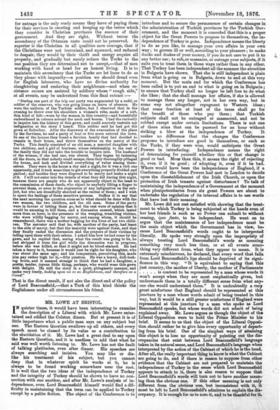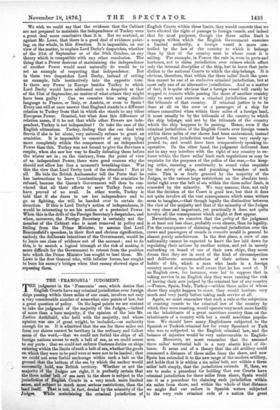MR. LOWE AT BRISTOL.
IN quieter times, it would have been interesting to examine the description of a Liberal with which Mr. Lowe enter- tained and edified the Colston diners. But at present it is of little importance what a public man says on any subject but one. The Eastern Question swallows up all others, and every speech must be classed by its value as a contribution to the elucidation of it. Mr. Lowe had a great deal to say upon the Eastern Question, and it is needless to add that what he said was well worth listening to. Mr. Lowe has not the fault of talking platitudes, even after dinner. His speeches are always searching and incisive. You may like or dis- like his treatment of his subject, but you cannot deny that in whatever spirit he works at it, he is always to be found working somewhere near the root. It is well that the two ideas of the independence of Turkey and the integrity of Turkey should be shown to have no con- nection with one another, and after Mr. Lowe's analysis of in- dependence, even Lord Beaconsfield himself would find a dif- ficulty in maintaining that the term can be applied to Turkey except by a polite fiction. The object of the Conference is to introduce and to secure the permanence of certain changes in the administration of Turkish provinces by the Turkish Gov- ernment, and the moment it is conceded that this is a proper object for the Great Powers to propose to themselves, the in- dependence of Turkey is gone. Independence means the liberty to do as you like, to manage your own affairs in your own way ; to govern ill or well, according to your pleasure ; to make ducks and drakes of your money, if you do not care to put it to any better use; to rob, or massacre, or outrage your subjects, if it suits you to treat them in those ways rather than in any other. That Turkey has been independent all the summer the atrocities in Bulgaria have shown. That she is still independent is plain from what is going on in Bulgaria, down to and at this very moment. But the main end for which the Conference has been called is to put an end to what is going on in Bulgaria ; to ensure that Turkey shall no longer be left free to do what she likes ; that she shall manage her affairs, if she is allowed to manage them any longer, not in her own way, but in some way not altogether repugnant to Western ideas ; that some fraction at least of the taxes shall go for the benefit of those who pay them ; that Turkish subjects shall not be outraged or massacred, and not be robbed except under certain limitations. There is not one of these aims that can be pursued for an hour without striking a blow at the independence of Turkey. It makes no difference that the changes the Conference proposes to introduce are good in themselves, or such as the Turks, if they were wise, would anticipate the Great Powers in introducing. Independence means the right of determining for yourself whether this or that change is good or bad. More than this, it means the right of rejecting it, even if it be good ; of adopting it, even if it be bad. Where would have been the independence of England, if a Conference of the Great Powers had met in London to decide upon the disestablishment of the Irish Church, or upon the protection of Irish tenants against disturbance ? To talk of maintaining the independence of a Government at the moment when plenipotentiaries from six great Powers are about to undertake the regulation of its internal affairs is to use words that have lost their meaning.
Mr. Lowe did not rest satisfied with showing that the treat- ment to which Turkey is being subjected at the hands even of her best friends is such as no Power can submit to without ceasing, ipso facto, to be independent. He went on to argue that the maintenance of her independence must be the main object which the Government has in view, be- cause Lord Beaconsfield's words ought to be interpreted literally. He spoke very strongly upon the impropriety of always treating Lord Beaconsfield's words as meaning something very much less than, or at all events some- thing very different from, what they appear to mean. It is extremely mischievous, he declared, that every word that falls from Lord Beaconsfield's lips should be deprived of its signi- ficance in this way. "It is equivalent to saying that this just country, the mother of liberty, the mother of Parliaments is content to be represented by a man whose words it won't accept when they are most emphatically given, but understands them in a totally different sense from what any. one else would understand them." It is undoubtedly a very great misfortune that England should be represented at this juncture by a man whose words admit of being treated in this way, but it would be a still greater misfortune if England were represented at this juncture by a man who spoke as Lord Beaconsfield speaks, but whose words did not admit of being explained away. Mr. Lowe argues as though the object of the Liberal Opposition were to hold the Prime Minister to his brief. It seems to us that the object of the Liberal Opposi- tion should rather be to give him every opportunity of depart- ing from his brief. One of the simplest ways of attaining this object is to lose no opportunity of pointing out the dis- crepancies that exist between Lord Beaconsfield's language taken in its natural sense, and Lord Beaconsfield's language when interpreted by the action of the Cabinet of which he is the head.
After all, the really important thing to know is what the Cabinet are going to do, and if there is reason to suppose from other evidence that the Cabinet are not prepared to maintain the independence of Turkey in the sense which Lord Beaconsfield appears to attach to it, there is also reason to suppose that Lord Beaconsfield's words will turn out to have another mean- ing than the obvious one. If this other meaning is not only different from the obvious one, but inconsistent with it, it must be left to Lord Beaconsfield's admirers to explain the dis- crepancy. It is enough for us to note it, and to be thankful for it. We wish we could say that the evidence that the Cabinet are not prepared to maintain the independence of Turkey were a great deal more conclusive than it is. But we contend, as against Mr. Lowe, that there is a good deal of evidence point- ing, on the whole, in this direction. It is impossible, on our view of the matter, to explain Lord Derby's despatches, whether of the 21st of September or of the 30th October, on any theory which is compatible with any other conclusion. The thing that a Power desirous of maintaining the independence of another Power would most naturally do would be to set an example of respecting that independence. But in these two despatches Lord Derby, instead of setting an example, falls instinctively into the opposite tone. Is there any Power in Europe besides Turkey to which Lord Derby would have addressed such a despatch as that of the 21st of September, no matter of what crimes they might have been guilty ? Can we conceive him using similar language to France, or Italy, or Austria, or even to Spain ? Every one will at once answer that England stands in a different relation to Turkey from that in which she stands to any other European Power. Granted, but what does this difference of relation mean, if it be not that while other Powers are inde- pendent, Turkey is not independent Or take the case of the English ultimatum. Turkey, feeling that she can deal with Servia if she is let alone, very naturally refuses to grant an armistice. It is impossible to conceive of any step lying more completely within the competence of an independent Power than this. Turkey was not bound to give the Servians a respite, when she saw her way to finally defeating them before the winter set in ; on the contrary, from the point of view of an independent Power, there were good reasons why she should not allow her foes a moment's breathing-time. Was this the view that Lord Derby took of the situation ? Not at all. He bids the British Ambassador tell the Porte that he has instructions to leave Constantinople if the armistice be refused, because the Queen's Government will then be con- vinced that all their efforts to save Turkey from ruin have proved of no avail. In other words, Turkey is told that if she dares to use her independence and to go on fighting, she will be handed over to certain de- struction. If this is Lord Derby's notion of independence, it would be interesting to see his notion of a protected Power. When this is the drift of the Foreign Secretary's despatches, and when, moreover, the Foreign Secretary is certainly not the Zaember of the Cabinet who is most removed in policy and feeling from the Prime Minister, to assume that Lord peaconsfield's speeches, in their first and obvious signification, embody the deliberate intentions of the Government, would be to leave one class of evidence out of the account ; and to do this, is to snatch a logical triumph at the risk of making it more difficult for the Government to retreat from the position into which the Prime Minister has sought to lead them. Mr. Lowe is the first General who, with inferior forces, has sought to burn his enemy's bridges when that enemy showed signs of repassing them.







































 Previous page
Previous page